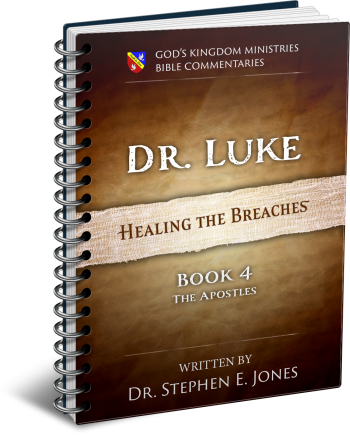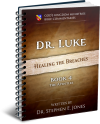Latest Posts
View the latest posts in an easy-to-read list format, with filtering options.

This book covers Luke 10-11, where Jesus sent out the Seventy with a specific message of the Kingdom.
Category - Bible Commentaries

The final “woe” comes in Luke 11:52,
52 Woe to you lawyers! For you have taken away the key of knowledge; you did not enter in yourselves, and those who were entering in you hindered.
In Matthew 23:13 we read a similar statement, showing that this was directed not only toward the lawyers, but also the scribes and Pharisees.
13 But woe to you, scribes and Pharisees, hypocrites, because you shut off the kingdom of heaven from men; for you do not enter in yourselves, nor do you allow those who are entering to go in.
Matthew may have been giving Jesus’ words from a different occasion. No doubt Jesus said similar things on many occasions and to different crowds. In Matthew’s account these words come as the scribes, Pharisees, and Sadducees tested Jesus with many difficult legal questions in order to trap Him in His words. (See Matthew 22, which leads directly to Jesus’ long discourse in Matthew 23.)
These religious leaders and “experts” in the law had “shut off the kingdom of heaven from men.” How? By hindering the light that was coming out of Jesus, so that the people were cut off from hearing the word. Because the people had great respect for these experts in the law, the people took them very seriously. Even though many of the people wanted to believe that Jesus was the Messiah, they were influenced by their leaders. The people had been told that they were ignorant, and the people—like children—believed this, rather than trust their own instincts and ability to hear God for themselves.
Luke adds that the lawyers had “taken away the key of knowledge.” It was a common expression in those days that when a wise teacher expounded on a Scripture, he was giving them a key that could unlock and open their understanding. So we see this expression used later in Luke 24:45,
45 Then He opened their minds to understand the Scriptures.
The particular “key” that Jesus used on that occasion (after His death and resurrection) is given in verse 46,
46 and He said to them, “Thus it is written, that the Christ should suffer and rise again from the dead the third day.”
Closely related to this are other Hebraisms, “their eyes were opened” (Matthew 9:30), or “his ears were opened” (Mark 7:35), or “his mouth was opened” (Luke 1:64). This conveyed a word picture of someone having the right keyword to open “doors” (eyes, ears, or mouths).
In Luke 11:52 the “key of knowledge” was the truth by which men might enter the Kingdom of heaven. The discussion leading up to this point in Luke’s narrative shows that this “key” was the light of the word that Jesus spoke. The religious leaders had committed blasphemy by hindering the light of Christ from reaching the people. In doing so, they took away the key of knowledge that might open their eyes and ears, removing the blindness and deafness which had been imposed upon that nation since the time of Moses (Deuteronomy 29:4).
In 2 Corinthians 3:14-16 the Apostle Paul referred to this problem in terms of a veil over their eyes, saying,
13 and are not as Moses, who used to put a veil over his face that the sons of Israel might not look intently at the end of what was fading away. 14 But their minds were hardened; for until this very day at the reading of the old covenant the same veil remains unlifted, because it is removed in Christ. 15 But to this day whenever Moses is read, a veil lies over their heart; 16 but whenever a man turns to the Lord, the veil is taken away.
In other words, when men place their confidence in the old covenant, their eyes are “veiled” so that they cannot see the glory of God that came from the face of Moses. The veil did not hinder Moses’ vision. Neither was the veil really on Moses’ face, but on the face of the people, as Paul explains in 2 Corinthians 4:3, 4,
3 And even if our gospel is veiled, it is veiled to those who are perishing, 4 in whose case the god of this world has blinded the minds of the unbelieving, that they might not see the glory of Christ, who is the image of God.
The veil prevented the people from seeing the glory of God that was to come in a permanent way through the New Covenant, which Moses revealed as a type of the glorified Christ in Exodus 34:29, 35.
Even today, those who believe and teach that the Jews are saved by the Old Covenant, while non-Jews are saved by the New Covenant, are relegating Jews to permanent blindness without realizing it. Any confidence in the Old Covenant merely prolongs blindness. We must view the law, the prophets, and the gospels through the eyes of the New Covenant. This is the key that opens the eyes and ears of the people.
Luke finishes this chapter in Luke 11:53, 54,
53 And when He left there, the scribes and the Pharisees began to be very hostile and to question Him closely on many subjects, 54 plotting against Him, to catch Him in something He might say.
When Moses gave the law, he prophesied in Deuteronomy 31:29 that after he died Israel would become corrupt and provoke God to anger. This idea is more fully developed in the laws of tribulation in Leviticus 26 and Deuteronomy 28. There we see how Israel’s “hostility” toward God brought God’s hostility toward Israel. Leviticus 26:40-42 then gives the solution, showing how and when God would fulfill His covenant with them.
40 If they confess their iniquity and the iniquity of their forefathers, in their unfaithfulness which they committed against Me, and also in their acting with hostility against Me—41 I also was acting with hostility against them, to bring them into the land of their enemies—or if their uncircumcised heart becomes humbled so that they then make amends for their iniquity, 42 then I will remember My covenant with Jacob, and I will remember also My covenant with Isaac, and My covenant with Abraham as well, and I will remember the land.
Israel’s “hostility” against Yahweh shows their hostility toward Jesus Christ, who, before His incarnation in Bethlehem, was the Creator (John 1:3) and who also gave them the law under the name Yahweh (Exodus 6:2, 3). This is shown by the prophetic statement in Exodus 15:2, which reads (literally),
2 Yahweh is my strength and song, and He has become my Yeshua [Jesus]; This is my God, and I will praise Him; My father’s God, and I will extol Him.
The prophets bear witness of Moses in Isaiah 12:2, 3,
2 Behold, God is my Yeshua, I will trust and not be afraid; for Yah Yahweh is my strength and song, and He has become my Yeshua. 3 Therefore you will joyously draw water from the springs [or wells] of Yeshua.
Jesus quoted verse 3 above when He called for the people to come to Him for spiritual drink in John 7:37, 38. So it is plain that Jesus understood Isaiah’s prophecy to be a direct reference to Himself. Every time the Scriptures speak of “salvation,” they prophesy of Jesus under His Hebrew name, Yeshua.
So when Leviticus 26:40 says that Israel would act “with hostility against Me,” that is, against Yahweh, we may understand this hostility to be directed at Yeshua-Jesus. This carried over into the New Testament when the religious leaders “began to be very hostile” against Jesus in Luke 11:53. This hostility would later be matched by divine hostility toward Judah and Jerusalem, when God raised up the Roman army to destroy that city, according to Jesus’ prophecy in Matthew 22:7,
7 But the king [God] was enraged and sent his [Roman] armies, and destroyed those murderers [religious leaders], and set their city [Jerusalem] on fire.
The solution, of course, is found in the laws of tribulation, as we have already read. They ought to humble themselves, repent and admit that they were wrong, and cease from their hostility to Yahweh-Yeshua-Jesus. Only when this happens will the curse of the law be removed from them, lifting the veil, and allowing them to be blessed according to the covenant with Abraham, Isaac, and Jacob.
It is not—and never will be the case—that non-Jews are saved by Christ and that Jews are saved apart from Christ. We are all saved by the same manner and by the same Creator, Lawgiver, Savior, and Redeemer.
This section of Luke, covering Luke 10 and 11, will form the fourth book in my series on Luke. It began with the disciples being commissioned as apostles, “those who are sent.” It then shows the obstacles from the religious leaders, who opposed the teaching of Jesus and His apostles. It shows also the contrast between those who heard the word and those who rejected it. It contrasted those who received the light of the Holy Spirit from those who hindered that light.
As the hostility increased, the stage was being set for the great act of redemption, as evil would be overcome by good, as hostility would give way to peace and reconciliation, as the curse would turn into blessing, corruption to incorruption, and mortality to immortality. “The veil which is stretched over all nations” (Isaiah 25:7) will be removed, so that the light of His glory might be seen unhindered throughout the whole earth.